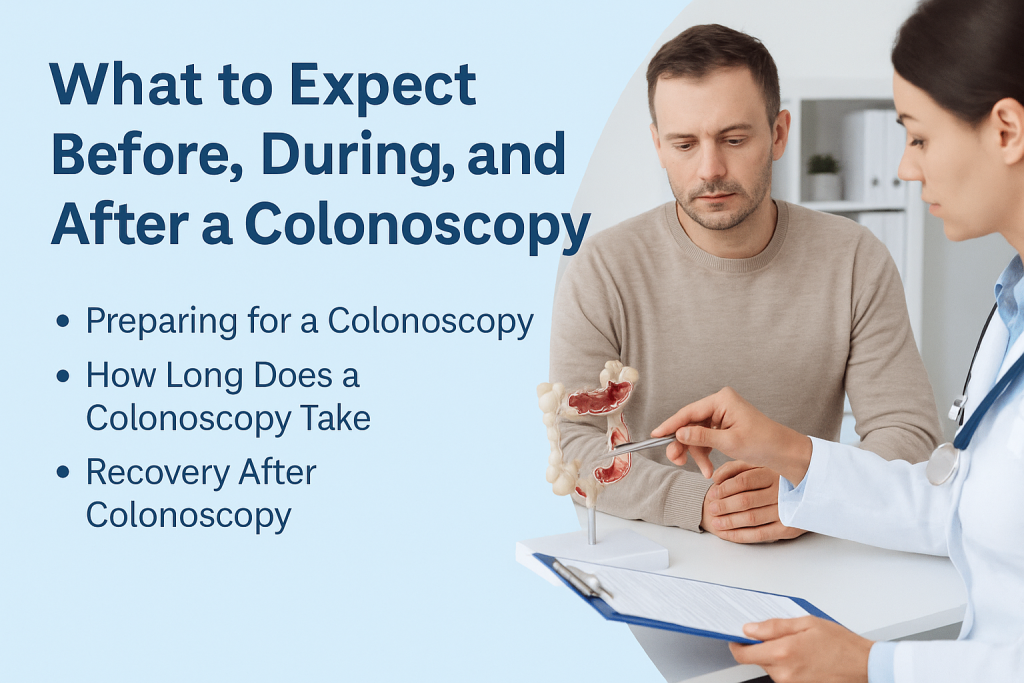One of the best diagnostic procedures for identifying colorectal problems, such as polyps, inflammatory bowel disease, and colon cancer, is a colonoscopy. You probably have questions like “How long does a colonoscopy take?” “How is recovery like?” and “How should I prepare?” if your doctor has recommended this procedure. This comprehensive guide will make sure you are informed and comfortable by taking you through every step of the process, from getting ready for a colonoscopy to recovering from one.

Why Is a Colonoscopy Important?
During a colonoscopy, gastroenterologists use a flexible tube equipped with a camera to look at the lining of your colon and rectum. It is an essential tool for the early detection of digestive disorders like colon cancer and
- Polyps (which may develop into cancer)
- Ulcers
- IBD (inflammatory bowel diseases), which include ulcerative colitis and Crohn’s disease
- Causes of persistent diarrhea, bleeding, or unexplained stomach pain
By identifying issues before they worsen, early detection via a colonoscopy can save lives.
Preparing for a Colonoscopy
Proper preparation is crucial to ensure your colon is completely clean, which helps your doctor get a clear view during the procedure. Here’s how to get ready:
1. Modifications to Diet Prior to the Process
You will be instructed to begin a clear liquid or low-fiber diet three to four days prior to the colonoscopy. Steer clear of foods high in fiber, such as whole grains, nuts, seeds, and raw vegetables.
Suggested foods:
- Broths that are clear
- Jell-O (no dyes that are red or purple)
- Sports drinks or apple juice
- Coffee or tea without cream
2. Preparing the Bowel (Laxatives)
The night before your procedure, your doctor will prescribe a bowel prep solution, which is typically a drink made of polyethylene glycol. This aids in colon cleansing.
Advice:
- Stay near a bathroom after you start consuming it.
- To prevent irritation, use moist wipes or calming ointments.
- To improve the taste, chill the prepared beverage.
3. Medication Adjustments
Inform your doctor about any medications you’re taking, including:
- Blood thinners
- Diabetes medications
- Iron supplements
You may need to adjust or stop these before your procedure.
How Long Does a Colonoscopy Take?
The actual process of a colonoscopy is usually completed in 30 to 60 minutes. Below is a summary of what to anticipate:
1. Prior to the procedure
Arrive one to one and a half hours early. An IV will be inserted for sedation after you check in and change into a gown.
2. Throughout the Process
After the patient is sedated, the physician will examine the entire colon with a colonoscope inserted into the rectum. If polyps are discovered, they may remove them or take tissue samples (biopsies).
3. After the Procedure
As the sedative wears off, you will be observed. Prior to being released, the majority of patients take a 30- to 60-minute nap.
What is the duration of a colonoscopy from beginning to end? You should anticipate being at the clinic for two to three hours in total.
Recovery After Colonoscopy: What to Expect
Although the procedure is minimally invasive, knowing what happens afterward is important for peace of mind and planning.
1.Immediate Colonoscopy Recovery
You may feel:
- Mild bloating or cramping
- Gas from the air introduced into your colon
- Grogginess from sedation (don’t drive for 24 hours)
2. When Can You Eat?
Once fully awake, most patients can resume eating bland, light foods. Begin by:
- Crackers or toast
- Soup
- Bananas or rice
To avoid discomfort, stay away from heavy or spicy meals for a day.
3. When to Get Back to Your Regular Activities
Although full recovery may vary if a polyp was removed, most people resume their regular activities the following day. It is advised to engage in mild exercise for 24 hours after the procedure.
Signs to Watch for After a Colonoscopy
Although complications are rare, contact your doctor immediately if you experience:
- Persistent bleeding from the rectum
- Fever or chills
- Dizziness or weakness
How to Support Your Digestive Health Post-Colonoscopy
It’s crucial to keep your digestive system in good condition following your colonoscopy. Think about:
- diet high in fiber (after a few days)
- Maintaining Hydration
- Frequent physical activity
- Regular screenings as advised
Your doctor will advise you on the next course of action, including possible follow-up visits or treatments, if any abnormalities were discovered.
Final Thoughts
A colonoscopy is a straightforward, secure, and extremely beneficial procedure for identifying and preventing serious gastrointestinal disorders, despite the fact that the concept may seem frightening. You can go into your appointment with confidence if you are well-prepared, know the procedure, and take good care of yourself after the procedure.
FAQs
Q1: How should I mentally prepare for a colonoscopy?
It’s natural to feel anxious. Talk to your doctor, ask questions, and remember the procedure is short, safe, and often painless due to sedation.
Q2: Can I work the day after the colonoscopy?
Yes, most people can resume work and normal activities the next day, unless otherwise advised by their doctor.
Q3: Will I need someone to accompany me?
Yes. Due to sedation, you’ll need a responsible adult to drive you home after the procedure.
